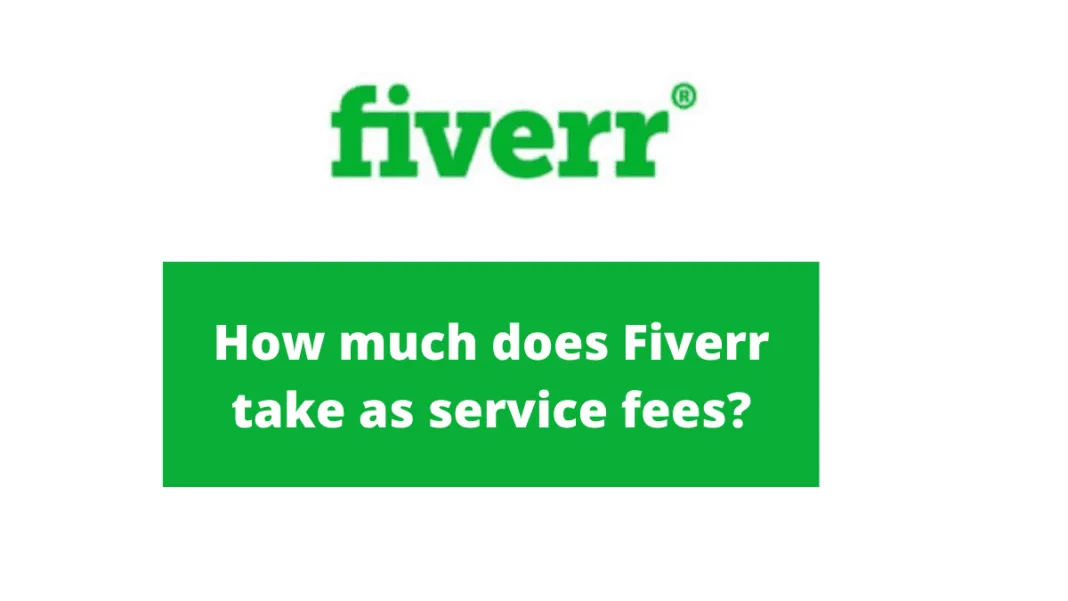So, you're interested in Fiverr and wondering how much they take from sellers, right? Well, you're not alone! Many sellers on the platform are curious about how Fiverr's fees work and how much they impact their earnings. After all, your income as a freelancer is crucial, so understanding the ins and outs of Fiverr's fees can help you price your services effectively. Let’s dive in and break it all down!
Understanding Fiverr's Fee Structure

Fiverr operates on a fairly straightforward fee structure that primarily revolves around a percentage cut from the total sale price. Here's what you need to know:
- Service Fee: When you sell a gig on Fiverr, they take a 20% commission from your total earnings. This means if you sell a gig for $100, only $80 will go into your pocket.
- Currency Conversion Fee: If you receive payments in a currency different from your bank account's currency, Fiverr may apply a currency conversion fee. This fee can vary depending on the service used for the currency exchange.
- Withdrawal Fees: Depending on how you choose to withdraw your funds, there could be additional fees. For instance, using PayPal or certain banking methods might incur transaction fees.
To make things clearer, here's a simple table summarizing potential deductions:
| Item | Fee |
|---|---|
| Service Commission | 20% of total earnings |
| Currency Conversion | Variable (depends on current rates) |
| Withdrawal Fees | Depends on the withdrawal method |
Understanding this fee structure is essential for setting competitive prices for your services while ensuring you still make a profit. Remember, it's all about balancing value for your clients and fair compensation for your work!
Also Read This: Can I Buy and Sell Both on Fiverr?
3. Percentage Deduction for Services

When you’re setting up your gigs on Fiverr, one of the first things you might notice is the platform's cut from your earnings. Typically, Fiverr takes a standard 20% commission from the total price of each order. This means if you sell a service for $100, you’ll receive $80 after Fiverr takes its commission.
Now, you might be wondering: Why a flat 20%? Well, Fiverr aims to provide you with a diverse marketplace and exposure to potential buyers across the globe. To maintain this ecosystem, they need to sustain operational costs. Here’s how the deduction works based on different order values:
| Order Price | Fiverr Deduction (20%) | Amount You Receive |
|---|---|---|
| $50 | $10 | $40 |
| $200 | $40 | $160 |
| $500 | $100 | $400 |
Keep in mind, this commission applies to the base price of the gig, excluding any add-ons or extras you may offer. So, get creative with those upsells and make the most out of your services!
Also Read This: How to Become a Freelance Copywriter and Get Clients
4. Additional Charges and Fees

Aside from the standard commission, Fiverr also has a few additional charges to keep in mind. It's essential to understand these extra fees so you can set your prices accordingly and protect your income. One primary charge to be aware of is the processing fee that’s applied to each order. This fee varies based on the total order amount but is typically around $2 for orders under $40.
Here’s a quick rundown of what additional fees you might encounter:
- Service Fees: Fiverr adds service fees for premium gigs. These may be a small percentage or a fixed amount based on the order’s total value.
- Withdrawal Fees: If you choose to withdraw your earnings, Fiverr may charge a fee depending on the withdrawal method, especially for PayPal and bank transfers.
- Currency Conversion Fees: If you’re selling internationally, be aware that conversions could incur extra charges depending on your payment method.
It's crucial to factor these additional charges into your pricing strategy to ensure you’re earning what you expect. After all, transparency with your pricing goes a long way in building trust with your clients!
Also Read This: How Can I Earn Money from Fiverr?
5. Impact of Currency Conversion

One significant factor that sellers on Fiverr need to consider is currency conversion. Fiverr operates globally, meaning transactions can involve various currencies. For sellers outside the United States, this can lead to some confusion and potential loss of earnings due to conversion rates.
When you sell a gig on Fiverr, the platform typically uses the US dollar as its primary currency. If your local currency is different, you'll see a conversion take place when Fiverr processes your earnings. Here’s how it impacts you:
- Conversion Fees: Depending on the payment method you use, there could be additional fees associated with converting your earnings into your local currency.
- Variable Rates: Currency exchange rates can fluctuate daily, which means the amount you receive can vary significantly from when you first set your gig price to when the funds are withdrawn.
- Time Delay: Sometimes, there's a delay between receiving your payment and actually being able to convert it to your local currency, especially if you're waiting for funds to clear.
This can lead to discrepancies between what you expect to earn and what you actually receive when the funds hit your account. Understanding these factors will help you set your gig prices more strategically and minimize unpleasant surprises along the way.
Also Read This: Do You Send Your Product to Fiverr for Product Photography?
6. Example Breakdown of Earnings
To help clarify how Fiverr deductions affect your overall earnings, let’s break down a hypothetical scenario. Imagine you have a gig priced at $100. Here’s how the earnings might pan out:
| Description | Amount (USD) |
|---|---|
| Gig Price | $100 |
| Fiverr Service Fee (20%) | -$20 |
| Remaining Earnings | $80 |
| Currency Conversion Fee (assumed 3%) | -$2.40 |
| Total Earnings After Deductions | $77.60 |
In this example, even though you initially earned $100, after Fiverr’s service fee and a hypothetical currency conversion fee, you end up with just $77.60. This shows how important it is to factor in these deductions when pricing your services on the platform. By understanding the entire breakdown, you can make better decisions and optimize your earning potential as a seller on Fiverr.
Also Read This: Understanding General TOS Violations on Fiverr
7. Tips for Maximizing Earnings on Fiverr
If you're a seller on Fiverr, maximizing your earnings is key to building a successful freelance career. Here are some practical tips to help you increase your income:
- Optimize Your Gig Descriptions: Use targeted keywords that potential buyers might use to find services like yours. Make your gig descriptions clear, engaging, and informative.
- Offer Competitive Pricing: When starting out, consider offering your services at a lower price to build your reputation. As you gain positive reviews, gradually increase your rates.
- Use Eye-Catching Images and Videos: Visual content is crucial for attracting buyers. Invest time in creating compelling images and videos that showcase your work and grab attention.
- Respond Promptly to Messages: Quick responses can enhance customer satisfaction and lead to more orders. A timely reply can make a difference in securing a sale.
- Bundle Services: Consider offering package deals or upsells. For example, if you provide graphic design services, you could create a bundle that includes multiple designs at a discounted rate.
- Market Your Services Outside Fiverr: Use social media, blogs, and forums to draw attention to your Fiverr gigs. Networking can greatly expand your reach.
- Collect and Display Positive Reviews: Positive feedback not only boosts your image but can also lead to increased sales. Encourage satisfied clients to leave reviews after completing a project.
Also Read This: Fiverr vs Freelancer: Which is Better for Your Freelance Needs?
8. Conclusion
In summary, understanding Fiverr's fee structure and the deductions from your earnings is vital for effective budgeting as a seller. By keeping a close watch on your expenses and applying smart strategies, you can significantly improve your bottom line. Remember, success on Fiverr doesn't happen overnight—it's a journey that requires patience and continuous learning.
In addition to implementing the tips provided, stay updated with Fiverr’s policies and emerging trends within your niche. The freelance marketplace is always evolving, and adapting your approach can make a substantial difference in your earnings. By refining your services, enhancing your visibility, and maintaining excellent client relationships, you're setting yourself up for long-term success. Go out there and turn your Fiverr gig into a thriving business!
FAQs about Fiverr Seller Deductions
If you're a seller on Fiverr, you might have questions about the deductions that occur from your earnings. Understanding these deductions is crucial for managing your finances effectively. Below are some common queries related to Fiverr seller deductions.
What is Fiverr's Service Fee?
Fiverr charges a service fee on each order completed through the platform. The standard service fee is:
- 20% for orders up to $40
- 10% for orders between $40 and $199
- 5% for orders $200 and above
When Does Fiverr Deduct Fees?
The service fee is deducted at the time an order is marked as complete. This means that you'll see your earnings after the deduction has been applied.
Are There Any Additional Costs?
Yes, in addition to the service fee, sellers may encounter other costs such as:
- Transaction fees associated with PayPal or bank withdrawals
- Currency conversion fees if applicable
- Possible taxes depending on your country of residence
What Happens If You Cancel an Order?
If an order is canceled, Fiverr will refund buyers, and as a seller, you will lose both the order amount and any associated fees. It's essential to communicate effectively with buyers to minimize cancellations.
How Can Sellers Minimize Deductions?
Here are a few tips to help sellers retain more of their earnings:
- Price your services strategically to avoid the 20% deduction on smaller orders.
- Promote larger gigs where the percentage fee is lower.
- Build a solid reputation to ensure fewer cancellations.
Understanding how Fiverr deducts from sellers' accounts is vital for effective financial planning. By being aware of these aspects, sellers can maximize their earnings and improve their overall experience on the platform.



